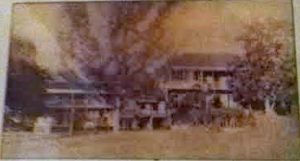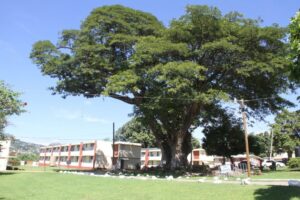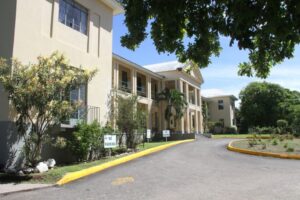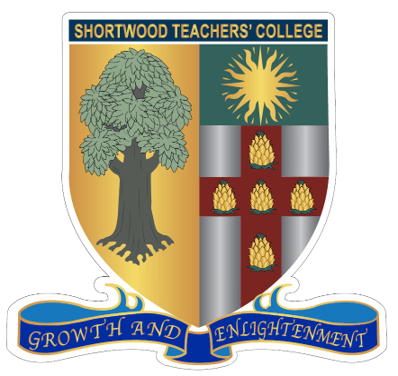 Shortwood Teachers’ College (STC) was founded on the 28th day of September 1885 as part of the package of widespread social, economic and political reforms, spearheaded by Sir John Peter Grant, who was appointed Governor of Jamaica in 1866.
Shortwood Teachers’ College (STC) was founded on the 28th day of September 1885 as part of the package of widespread social, economic and political reforms, spearheaded by Sir John Peter Grant, who was appointed Governor of Jamaica in 1866.
Previous to this date, efforts had been made to open such an institution. The appointed time for the approval of this particular vision was, 1st October 1880 with the appointment of Mr. Thomas Capper, B.A., as the new Superintendent Inspector of Schools. He emphasized the need for more women “of quality” to be trained as teachers. He also felt that their influence on the minds and manners of young children could be salutary for the development of the people.
The efforts of the new Inspector were avidly supported by such educators as the Rev. A. Robb, D.D.; Mr. George Hicks, M.A., Inspector of Schools and the Rt. Rev. Enos Nuttall, D.D., then Archbishop of the West Indies, who became the first Chairman of the Board of Management. It was his enthusiasm and energy, it was felt, which lit the way to the glorious inception of the College.
The passion of these gentlemen attracted the attention of the newly appointed Governor, Sir Henry Norman who represented the urgent need for such an institution to the Home Government, which sanctioned the project. On September 28, 1885, the Jamaica Female Training College, with Miss Amy C. Johnson as its Principal and Miss M.C. Randall as her assistant, opened its door to eighteen students.
The College, fully financed by government, was first located in lower Barbican, but it was later removed to Camperdown, following a case of yellow fever. It remained at that location until 1887 when the government purchased part of the Shortwood Estate, the property on which the College now stands. It was at this time that the College came to be called Shortwood Teachers’ College.
The staff consisted of the Principal and her assistant, Miss M.C. Randall, Miss E. Roberts, Mistress of the newly established Practising School; Mr. E.A. Andrews, Secretary to the Board of Visitors and Dr. J. Cargill, Medical Officer.
The first Board of Management consisted of the following:
The Right Rev. Enos Nuttall, D.D., Archbishop of The West Indies, Lady Norman, the Hon. T. Capper, M.A., the Ven. Archdeacon Douet, M.A., Mr. Clive Justice, Rev W. Gillies, D.D., Rev. D.J. East, Mr. James Cochrane, Mr. James Roberts, Rev. A. Taylor, Thomas Oughton, Esquire.
Consistent with the Department of Education Code of Regulations, which states that “A college should include either on its premises or within a convenient distance, a practising school in which the students might learn the practical exercise of the profession,” the Shortwood Practising School was establised in 1887. Interestingly, the first schoolroom was originally the Stables of the Archbold’s Estate, which was frequently used by Sir Henry Morgan. In 1954, the school was given a new site at the southern section of the College campus, bordering on Olivier Road.
By 1889, the College began to experience serious financial problems and would have floundered had not the Lamb Report of 1889, with the full support of Archbishop Nuttall, recommended that the College be expanded to make it viable. Following this recommendation, the student body was increased to sixty students and an annual grant of one thousand two hundred pounds sterling (£1,200.00) was given by Government. The administration of the College was also entrusted to an Interdenominational Board under the chairmanship of Archbishop Nuttall.
In addition, the curriculum was expanded to include practical subjects such as agricultural science, domestic training, gardening, cookery and laundry. The College grew physically as additions were made to various buildings. From this point on, the institution entered a period of quiet and steady growth and enlightenment, despite the devastation caused by the earthquake of 1907 and two fires between the years 1937 and1939.
In 1916, following the death of Archbishop Nuttall, the Board founded the “Nuttall Scholarship” consisting of a cash award of five pounds sterling and books to the value of thirty shillings. This was an annual award to the student deemed to have achieved the highest grades in the Second Year Examinations, and who showed herself to be “simple, honest, industrious, womanly, helpful and God-fearing.”
For approximately seventy (70) years the annual enrolment was sixty (60) students, who were required to pay an annual tuition and boarding fee, except for exhibitioners — a few who did exceptionally well in matriculating for College. The fee-paying system was discontinued in 1957 during the regime of Mrs. Ruby Meredith, Principal, 1952 — 1964 and the Chairmanship of the Rev. P. W. Gibson. The absence of fees led to a rapid numerical growth, so that by 1960 the student body numbered 193. The signal growth necessitated the construction of hostels and additional classroom facilities.

A more rapid development occurred in the mid 1960’s when there was a general expansion of educational opportunities; teachers were in demand for the new Junior Secondary Schools and students who matriculated for specialized subject areas were trained for secondary and traditional high schools. The Internship Model of teacher training was introduced to all teachers’ colleges thus replacing the former Three-Year Certificate Programme. Shortwood Teachers’ College played a dominant role in this innovation; by 1973 the student body numbered 464. Miss Marjorie A. Myers, Principal 1964 — 1988, was actively engaged in a rapid expansion of residential facilities for staff and students.
In the early 1980s STC with the other teacher-training colleges contributed to policy changes for the institution of the present Three-Year Diploma programme. Miss Ethel Webber, then Vice Principal, acted as Principal 1988 -1989. With the rationalization in Teacher Education, the Primary Programme was phased out by 2000 and the College continued to prepare teachers for the Secondary and Early Childhood sectors.
Under the leadership of Mrs. Norma H. Darlington, Principal, 1989 — 2002, Shortwood Teachers’ College advanced to a new level in its academic offerings.
In August 1996, the College in collaboration with the University of the West Indies (UWI), welcomed its first batch of twenty students to its Bachelor of Education Degree in Early Childhood Education. The Bachelor of Science Degree in Human Ecology was offered in 2004 under a similar arrangement with the UWI, St. Augustine Campus, but was discontinued in 2007 when the group of students graduated. In August 2000, the Master of Arts Degree in Early Childhood Education in collaboration with the University of South Florida was introduced.
History was created in 2001, when Shortwood Teachers’ College opened its doors to three male students to pursue programmes in Modern Language and Linguistics. Today, there are male students in all the programmes.
In addition, Shortwood offered the Bachelor of Education in Early Childhood Education, Human Ecology, Language Arts, Geography/History/Social Studies, Religious Education and Modern Languages through the Consortium of Institutions for Teacher Education (CITE), on a part- time or full- time basis. Most of these programmes have been accredited by the University Council of Jamaica but have been discontinued with the offering of the 4-Year Degree Programme which started in the Academic Year 2011-2012. The total enrolment of the student body now stands at twelve hundred (1200) in all the programmes.
The Early Childhood Institute, a brain child of Mrs. Norma H. Darlington, is the only one of its kind in the Caribbean. The first of three phases was commissioned into service at the start of the academic year 2008- 2009. This institute was conceptualized to provide support to early education and care in the Caribbean. When fully operational the institute will house a model day care facility, conduct research in early childhood education and care and offer professional development programmes to the early childhood sector.
Under the leadership of Mrs. Elaine Foster-Allen from 2002 – 2014 , the College in an effort to up-grade pre-trained Early Childhood teachers, started an off-campus part-time Early Childhood Diploma programme in Portmore, St. Catherine in September, 2003. This programme has been offered on the campus since September 2004.
In 2006, the College collaborated with the International University of the Caribbean (IUC), to prepare teachers for the Diploma in Early Childhood Education on a part- time basis. Additionally, the College collaborates with the T.A. Marryshow Community College in Grenada to prepare teachers at the diploma level on a full time basis. This latest pioneering effort of the College was a resounding success. The College has a longstanding professional relationship with The George Brown College, Toronto, Canada to foster a cultural exchange between students and faculty of both institutions.
During the 2009 — 2010 academic year, Shortwood Teachers’ College established two major departments — (i) the Office of Research, Development and Projects, directed by Dr. George R. Dawkins and (ii) the Quality Assurance Department, directed by Dr. Lincoln D. Phipps. These two departments are primarily concerned with (i) “… providing the College community with the training, resources and motivation required to conduct action-based research for personal, professional, institutional and national development” and (ii) developing effectiveness in leadership, training of staff and students and excellence in performance”. The College’s inaugural Research Conference was held on April 29, 2010 with keynote speaker, former Prime Minister, Mr. Edward Seaga. The conference included the presentation of twenty (24) Research Papers from faculty and external stakeholders. The first Quality Awards Banquet was held on May 6, 2010, were among the highlights of the 125th Anniversary Celebrations of the College.
During the 125th Anniversary Celebrations there was the opening of the Golden Orchard which was established in honour of Asafa Powell, Michael Frater, and Nesta Carter who donated a small sum to the College to replant the orchard to commemorate their World Record breaking performance in the 4x400m relay at the Beijing Olympics 2008. The Rev. Father Franklin Jackson, Minister in Charge, Church of the Transfiguration presided over the opening of the Golden Orchard.
Shortwood Teachers’ College now stands better equipped with new and improved facilities and an intellectually sharpened staff, poised at the cutting edge for an ever-changing society. During the period 2008 — 2010, Mrs. Elaine Foster-Allen was seconded to the Ministry of Education to serve as Chief Inspector of the National Education Inspectorate. In her absence, Dr. Christopher Clarke served as Acting Principal.

In 2006, the vision of the then Principal Mrs. Elaine Foster-Allen led to the provisional appointment of a second Vice Principal. Mrs. Dosseth Edwards-Watson was selected for the office. A year later the Ministry of Education added the post of a second Vice Principal to the establishment of all colleges.
In December 2012 the College again answered the call to national duty as Mrs. Elaine Foster-Allen was asked to serve as Permanent Secretary in the Ministry of Education. Dr Christopher was again asked to lead the College and Dr. George Dawkins was then promoted to Vice Principal Academic Affairs & Research. In August 2015, Mrs. Dosseth Edwards-Watson, Vice Principal Administrative Affairs was seconded to lead another educational institution and Dr. Claudette Barrett-March, Director of Practicum, Professional Development & Projects assumed the office as acting Vice Principal for Administrative Affairs. The management team is completed by Dr. Lincoln Phipps, Director of Quality Assurance and, Dr. Everton Cummings who now acts as Director of Practicum, Professional Development & Projects.
This institution has constantly benefited from the goodwill of groups and individuals. The Shortwood Foundation and the Friends of Shortwood, established in 1995 and 1998 respectively, and the Shortwood Old Students Association (SOSA), have supported the College in diverse ways. An annual Founders’ Week celebration is observed, a Thanksgiving Service and the Norma H. Darlington Founders’ Day Lecture are celebratory highlights.
During the Founders’ Week Celebrations of 2013, there was the opening of La Tiende de Regalos (Gift Shop) due in part to a loan from the Class of 1963. The shop displays an array of memorabilia of the College.
Shortwood Teachers’ College has collaborated with several international organizations to facilitate service learning activities and to foster relationships among students of the Early Childhood and Modern Languages programmes. These relationships provide opportunities for students to gain credits towards courses as well as international experience as they pursue their Bachelor’s degree in Education.
As the Mission Statement declares, “Shortwood Teachers’ College is committed to the preparation of teachers of the highest quality”. The College, therefore, continues to be in steadfast pursuit of excellence to achieve this goal, and pursue its motto: “Committed to Growth and Enlightenment”.
Student Affairs Office
(876)924-1095 Ext. 5000
[email protected]
Mon – Fri 9:00A.M. – 5:00P.M.
